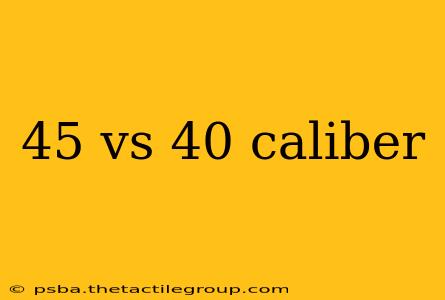Choosing between a .45 ACP and a .40 S&W cartridge is a common dilemma for firearm enthusiasts, law enforcement professionals, and self-defense advocates. Both calibers boast significant stopping power, but their distinct characteristics cater to different needs and preferences. This in-depth comparison will explore the key differences between the .45 ACP and .40 S&W, helping you make an informed decision based on your specific requirements.
Ballistics: Power and Performance on the Range
The most significant difference lies in their ballistics. The .45 ACP (.45 Automatic Colt Pistol) fires a larger, heavier bullet – typically ranging from 200 to 230 grains – at a slower velocity. This translates to substantial stopping power due to its higher energy transfer upon impact. The larger diameter bullet also creates a wider wound channel.
The .40 S&W (.40 Smith & Wesson), on the other hand, uses a smaller, faster bullet – typically weighing between 155 and 180 grains. While its energy transfer is less than the .45 ACP, it boasts a higher muzzle velocity, resulting in a flatter trajectory and potentially better accuracy at longer ranges.
| Feature | .45 ACP | .40 S&W |
|---|---|---|
| Caliber | .45 inches (11.43 mm) | .40 inches (10.16 mm) |
| Bullet Weight | 200-230 grains | 155-180 grains |
| Muzzle Velocity | Relatively lower | Relatively higher |
| Recoil | Higher | Lower |
| Stopping Power | Generally higher | Generally lower |
| Accuracy | Can vary depending on firearm | Generally better at longer ranges |
Recoil Management: A Key Consideration
The .45 ACP's larger cartridge and heavier bullet result in significantly more recoil than the .40 S&W. This can be a major factor for shooters with less experience or those seeking a more manageable firearm for concealed carry or extended shooting sessions. The reduced recoil of the .40 S&W allows for quicker follow-up shots, a critical advantage in self-defense situations.
Capacity and Magazine Size: Rounds in the Fight
Magazine capacity also differs significantly. While .45 ACP magazines typically hold fewer rounds than .40 S&W magazines, the stopping power of the .45 ACP might compensate for this difference depending on the situation. The higher capacity of .40 S&W magazines offers a tactical advantage in scenarios requiring multiple shots.
Cost and Availability: Budget and Accessibility
The cost of ammunition can vary based on brand, availability, and market fluctuations. Generally, .40 S&W ammunition is often slightly less expensive than .45 ACP, making it a more budget-friendly option for regular practice and training. However, both calibers are widely available, ensuring accessibility for most shooters.
Conclusion: The Right Caliber for You
Ultimately, the choice between .45 ACP and .40 S&W depends on individual needs and priorities. The .45 ACP offers superior stopping power and a larger wound cavity, making it a preferred choice for self-defense and those prioritizing immediate incapacitation. However, its higher recoil and lower capacity might be drawbacks for some.
The .40 S&W boasts a balance of power, accuracy, and manageable recoil. Its higher capacity and lower cost make it suitable for law enforcement, competitive shooting, and those seeking a versatile cartridge with less recoil.
Before making a decision, it's crucial to handle both calibers, practice with them, and consider factors like your experience level, intended use, and personal preferences. Consulting with experienced firearms instructors or professionals can further assist in making an informed choice that aligns with your specific requirements.

